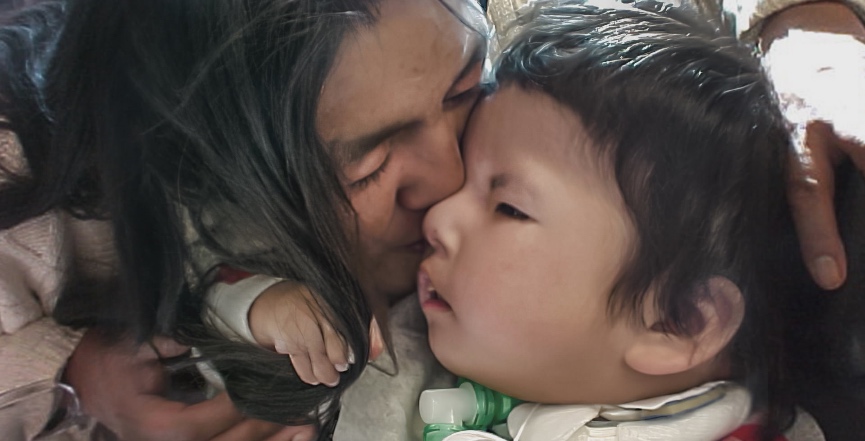In her newest film, Indigenous writer and director Alanis Obomsawin documents the short life of Jordan River Anderson, and his legacy for Aboriginal children in the form of “Jordan’s Principle.”
Jordan’s parents were from the Norway House Cree Nation, Manitoba, located 800 kilometres north of Winnipeg. Jordan’s mother Virginia had to be flown to Winnipeg to give birth at the children’s hospital due to complications. Jordan was born in that hospital, and never left. There was a dispute between the Manitoba and federal governments as to which level was responsible for Jordan’s home-care costs. So because this issue remained unresolved until Jordan died in 2005, he never went home. Ironically, the hospital care he received was ultimately also the most expensive, and tragically, the distance destroyed his family.
Jordan’s face was paralyzed, and he needed to be fed through his stomach. Jordan breathed through a hole in his throat, and he never spoke. Jordan had to be in or near a hospital in a medical foster home. The federal and provincial governments could not agree which would pay for the modifications to a medical foster home that would be needed to accommodate Jordan in his home community. So Jordan was never released from the hospital. Jordan’s mother had to divide her time between Jordan in the hospital and her other three children back in Norway House. The other children were left without a mother for months at a time. Jordan died when he was barely five years old. His mother outlived him by just 10 months.
Jordan’s short existence gave the lie to any assertion that all Canadians enjoy equal access to health care. Due to an effective campaign on the part of Indigenous activists, the House of Commons passed “Jordan’s Principle” into law in 2007. It states, in essence, that when an Indigenous child is in need of health care, the first level of government contacted will provide the care, even if there is a jurisdictional dispute. This should have prevented any other Indigenous children falling through any jurisdictional cracks in future, but unfortunately, things are never that easy for First Nations.
When the needs of other Indigenous children met with the same jurisdictional infighting, it took a decision in the Canadian Human Rights Commission v. Indigenous and Northern Affairs Canada case to finally give spirit to the letter of Jordan’s Principle. The battle was taken on behalf of a 16-year-old Indigenous boy named Noah Buffalo-Jackson. When Noah’s parents tried to put him in school, neither the school nor the family could not get funding for the accommodations necessary to get Noah to school, solely because they lived on a reserve. Notwithstanding Jordan’s Principle, they had to take the case to the Canadian Human Rights Commission and it took two compliance orders from the commission to finally get Noah into school, like any other child in Canada.
The Truth and Reconciliation Commission daylighted the residential school cultural genocide and the Sixties Scoop in the way separating children from their families destroyed these families. However, inadvertently or otherwise, Canadian governments at every level have continued to separate Indigenous children, and heap hardship upon, Indigenous families well into the new millennium. The government bureaucracies administering the Indian Act continued to be so crystallized in their oppressive roles that they could do nothing else. Such stories continue to this day, but are not often heard or seen.
Jordan River Anderson, The Messenger tells a story that would never be told were it not for the National Film Board’s support for Indigenous-led productions. It is beautifully shot and edited. The subjects are permitted to articulate their respective stories with no prompting or artifice.
Jordan’s life was short and full of suffering, but through the efforts of his family and dedicated Aboriginal activists, it was certainly not without meaning. Jordan’s Principle is now a law in Canada in both letter and spirit. Over 219,000 services to Indigenous children have been approved (as of February 2019) that might otherwise have been denied in the labyrinth of intergovernmental jurisdictions. Jordan’s Principle and its subsequent enforcement by the Canadian Human Rights Commission has forced governments to shoulder responsibility for the laws they make and to not use their resources to avoid their obligations to Indigenous people.
Jordan River Anderson, The Messenger reminds us of the battles that continue to be fought by Indigenous communities to assure a future for their children. Although Jordan never spoke, through the legal changes his short life wrought, his voice continues to be heard across Canada.
Humberto da Silva was born and lives in Toronto. Currently he is a videographer, a citizen journalist and a radical commentator
Image: Jordan River Anderson, The Messenger



